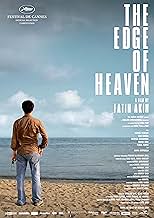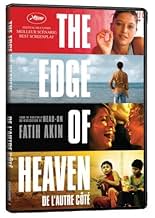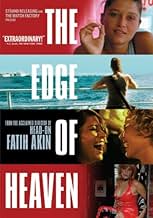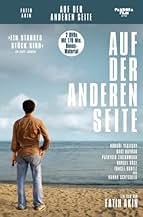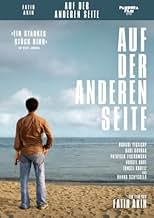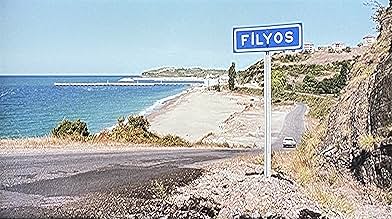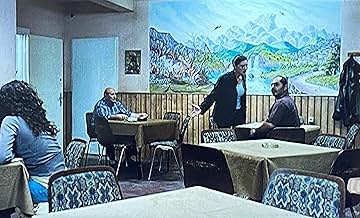VALUTAZIONE IMDb
7,7/10
34.912
LA TUA VALUTAZIONE
Un uomo turco si reca a Istanbul per trovare la figlia dell'ex fidanzata di suo padre.Un uomo turco si reca a Istanbul per trovare la figlia dell'ex fidanzata di suo padre.Un uomo turco si reca a Istanbul per trovare la figlia dell'ex fidanzata di suo padre.
- Regia
- Sceneggiatura
- Star
- Premi
- 37 vittorie e 22 candidature totali
Recensioni in evidenza
I usually comment on films right after I've seen them. However, "Auf der anderen Seite" (The Edge of Heaven), touched me in a way that few films do, so a month has passed.
This story of two sets of mothers and daughters, a father and his son...and a gun seems familiar, but its resolution is anything but. To lay out the plot would be daunting. So much ground is covered, yet it unfolds effortlessly. F a t i h Akin's screenplay is elliptical--the story starts where it finishes--but by the end, when the opening scene is replayed, our journey with these characters puts us, indeed, on the edge of transcendence.
Amid the desperation on display, small details brim over the images: a son waters his father's tomato plants pausing to taste the ripened fruit, a mother pits cherries that stain her fingers, another manicures her nails to avoid a quarrel, we imagine a bookstore's--specifically a German language bookstore in Istanbul--smell and the safety it can bring to a foreigner.... These domestic details are set against much larger, although finally insignificant, struggles: the cultural divide of immigrants, students revolting against an oppressive government, how imprisonment can deaden the soul. But F a t i h Akin wants the basic struggles of family bonds to be central here. It's the resolution of family rifts--small and large, emotional and physical--that are urgent.
The choice of settings, music, lighting... all carefully selected to build toward one moment that catches us off guard. When a foreigner asks "What is Kurban Bayrami?" (a Turkish holiday) the many seemingly disparate elements that we've been watching--in good faith because they're so rivetingly told--suddenly come together, it almost knocked the breath out of me.
Whether or not we as viewers have lost a father or mother or a child, through death, physical separation or emotional turmoil, we can understand what these characters suffer. And how all that can be healedthe willingness to have faith that good intentions can mend this troubled worldis something like a miracle to find illustrated on film. The weapons these characters lay down to pursue goodness don't necessarily have the effect they intend, but as we watch lives torn apart and then healed we see what they don't. And we carry that lesson out of theater with us.
This story of two sets of mothers and daughters, a father and his son...and a gun seems familiar, but its resolution is anything but. To lay out the plot would be daunting. So much ground is covered, yet it unfolds effortlessly. F a t i h Akin's screenplay is elliptical--the story starts where it finishes--but by the end, when the opening scene is replayed, our journey with these characters puts us, indeed, on the edge of transcendence.
Amid the desperation on display, small details brim over the images: a son waters his father's tomato plants pausing to taste the ripened fruit, a mother pits cherries that stain her fingers, another manicures her nails to avoid a quarrel, we imagine a bookstore's--specifically a German language bookstore in Istanbul--smell and the safety it can bring to a foreigner.... These domestic details are set against much larger, although finally insignificant, struggles: the cultural divide of immigrants, students revolting against an oppressive government, how imprisonment can deaden the soul. But F a t i h Akin wants the basic struggles of family bonds to be central here. It's the resolution of family rifts--small and large, emotional and physical--that are urgent.
The choice of settings, music, lighting... all carefully selected to build toward one moment that catches us off guard. When a foreigner asks "What is Kurban Bayrami?" (a Turkish holiday) the many seemingly disparate elements that we've been watching--in good faith because they're so rivetingly told--suddenly come together, it almost knocked the breath out of me.
Whether or not we as viewers have lost a father or mother or a child, through death, physical separation or emotional turmoil, we can understand what these characters suffer. And how all that can be healedthe willingness to have faith that good intentions can mend this troubled worldis something like a miracle to find illustrated on film. The weapons these characters lay down to pursue goodness don't necessarily have the effect they intend, but as we watch lives torn apart and then healed we see what they don't. And we carry that lesson out of theater with us.
This is the "Short Cut" concept once again, but in a much more clever way. It says that everybody are destined to get together. For better and for worse. We don't know it, but our movie audience understands.
This is also about the relation between Germany and Turkey and West and East at the present moment. The two are closer now than they used to be, but both parts are still hurt after each meeting. Unconditional love is hard to reach, but people try, without knowing it.
A movie about sadness but also a little about hope. Many things are too late, but some things aren't. You'll definitely sit through the final scene, for reasons which shall not be mentioned here.
This is also about the relation between Germany and Turkey and West and East at the present moment. The two are closer now than they used to be, but both parts are still hurt after each meeting. Unconditional love is hard to reach, but people try, without knowing it.
A movie about sadness but also a little about hope. Many things are too late, but some things aren't. You'll definitely sit through the final scene, for reasons which shall not be mentioned here.
With a small scale ensemble cast, The Edge of Heaven examines several themes through the lives of the many characters. Nejat Aksu (Baki Davrak) is a professor of literature in a German university and not happy about his father Ali's new live-in partner Yeter (Nursel Köse), a prostitute who Ali (Tuncel Kurtiz) has hired to stay with him. Yeter has an estranged daughter Ayten (Nurgül Yesilçay) who Nejat decides to track down in Turkey after a tragedy occurs in the family. However, unbeknownst to Yeter and Nejat, Ayten has already traveled to Germany to look for her mother and seek a refugee status as she is a member of a rebellious activist group in Turkey. In Germany she meets a female student Charlotte (Patrycia Ziolkowska) who offers her a place to stay and eventually follows her back to Turkey, much to her mother Susanne's (Hanna Schygulla) chagrin.
The two main story lines (those of Nejat / Yeter and Ayten / Charlotte) are presented after each other in a clear manner but the stories intertwine in many ways, often unnoticed by the characters, creating an extra feel of tragedy – the answer would be so close if only they knew each other! Besides the smaller instances of bad luck, the deaths of major characters are what end up driving the plot forwards, but in the end the message is hopeful; an understanding is what everybody is ultimately seeking.
Akin's calm direction and the good performances throughout easily raise The Edge of Heaven among the best Turkish films I've seen (even though I have only seen a handful). The themes of finding one's true calling in life, the forgiving nature of parent–child relationships and the subpar human rights situation in Turkey are all explored without haste, always maintaining the balance between the different aspects of the story. For anyone who hasn't seen many Turkish films, The Edge of Heaven could be a good starting place, but I imagine it is also worth seeing for those more familiar with the country's cinema.
The two main story lines (those of Nejat / Yeter and Ayten / Charlotte) are presented after each other in a clear manner but the stories intertwine in many ways, often unnoticed by the characters, creating an extra feel of tragedy – the answer would be so close if only they knew each other! Besides the smaller instances of bad luck, the deaths of major characters are what end up driving the plot forwards, but in the end the message is hopeful; an understanding is what everybody is ultimately seeking.
Akin's calm direction and the good performances throughout easily raise The Edge of Heaven among the best Turkish films I've seen (even though I have only seen a handful). The themes of finding one's true calling in life, the forgiving nature of parent–child relationships and the subpar human rights situation in Turkey are all explored without haste, always maintaining the balance between the different aspects of the story. For anyone who hasn't seen many Turkish films, The Edge of Heaven could be a good starting place, but I imagine it is also worth seeing for those more familiar with the country's cinema.
The Edge of Heaven
This is such a powerful, expansive, yet intimate movie about one of the things that matters most in our times, it's hard to fault it. The acting, the events, the setting, and implications of all these characters meeting and not quite meeting, suck you in. If it seems to have a lull now and then, you end up feeling the pace of their lives, and the pace of life itself. The events, even when they have a comic twist, are so heady and difficult they could make whole films each by themselves, but here they work through several related sections within a single tapestry.
As strong as the acting is, the core of the movie is the series of events, the plot. You'll see early on some coincidences beyond reason, making the plot almost Shakespearean, and therefore artful. The roles are each character are just a little surprising, just enough to keep us curious, yet each character represents a distinctive aspect of the crosscurrents of German and Turkish cultures and worlds, such as old people assimilating and young people refusing to assimilate. Even more than the mixing of Mexican and American worlds here in the U.S., this is a dramatic and more contentious melding, fraught with all those dangers of misunderstanding we hear in the news every day. Yet when it's brought down to the level of individuals, even seemingly unyielding ones, humanity wins.
I don't know how this film will carry itself in a couple decades. As well made as it is, it feels rooted in the moment, and when the times change yet again, there might be some kind of art or magic or transcendence missing to make it fully transport a viewer. It will remain interesting, but possibly less moving. But then, maybe the themes, of parents and children, of friends looking for who they miss and avoiding who they can't stand any more, might just be universal. But as a reflection of our world right now, 2009 (or 2007, when the movie was finished), it helped clarify just what life is like out there, beyond cinematic glitter and glam, beyond hyped up violence and romance. And beyond even the limitations of documentary in creating aura.
The Edge of Heaven happens to end with such lyrical highs, the name of the movie hits you hard. We are reminded of what exists beyond all the trappings that made so many people in the previous two hours so miserable, and it's there for us to tap into and to have in common, regardless.
This is such a powerful, expansive, yet intimate movie about one of the things that matters most in our times, it's hard to fault it. The acting, the events, the setting, and implications of all these characters meeting and not quite meeting, suck you in. If it seems to have a lull now and then, you end up feeling the pace of their lives, and the pace of life itself. The events, even when they have a comic twist, are so heady and difficult they could make whole films each by themselves, but here they work through several related sections within a single tapestry.
As strong as the acting is, the core of the movie is the series of events, the plot. You'll see early on some coincidences beyond reason, making the plot almost Shakespearean, and therefore artful. The roles are each character are just a little surprising, just enough to keep us curious, yet each character represents a distinctive aspect of the crosscurrents of German and Turkish cultures and worlds, such as old people assimilating and young people refusing to assimilate. Even more than the mixing of Mexican and American worlds here in the U.S., this is a dramatic and more contentious melding, fraught with all those dangers of misunderstanding we hear in the news every day. Yet when it's brought down to the level of individuals, even seemingly unyielding ones, humanity wins.
I don't know how this film will carry itself in a couple decades. As well made as it is, it feels rooted in the moment, and when the times change yet again, there might be some kind of art or magic or transcendence missing to make it fully transport a viewer. It will remain interesting, but possibly less moving. But then, maybe the themes, of parents and children, of friends looking for who they miss and avoiding who they can't stand any more, might just be universal. But as a reflection of our world right now, 2009 (or 2007, when the movie was finished), it helped clarify just what life is like out there, beyond cinematic glitter and glam, beyond hyped up violence and romance. And beyond even the limitations of documentary in creating aura.
The Edge of Heaven happens to end with such lyrical highs, the name of the movie hits you hard. We are reminded of what exists beyond all the trappings that made so many people in the previous two hours so miserable, and it's there for us to tap into and to have in common, regardless.
Faith Akin, renowned for his energetic movie 'Gegen die Wand', brings another story about the Turkish-German community. The movie focuses on three families who are all connected in some way. In a beautiful way Akin shows the struggle of a Turkish prostitute, a professor of German literature, a young Turkish rebel, a student English and Spanish and a retired widower to find peace and happiness in their lives. Akin manages to avoid the many pitfalls which can lead to clichés. The characters remain just ordinary people with genuine emotions and problems. The movie also depicts the impact of globalization and multiculturalism in nowadays Germany and Turkey. It's the most debated topic of our time. To what extent do we want newcomers to adapt to their new surroundings and to what extent do we accept them to cherish their own cultural heritage. In an even broader perspective, it deals with the clash between the Islamic and western world. 'Auf der anderen Seite', which means on the other side, shows how Turkish immigrants come to love their new country, Germany, without losing their Turkish roots. I think Akin invites us to try and imagine the backgrounds of people, so there will be less misunderstanding. This view is symbolized by Lotte, a German student, who decides to help Ayten, a Turkish political activist who fled Turkey. She doesn't know the Turkish girl but just wants to help her, because the girl has nowhere to go. This quest even brings her to the shores of Istanbul, a city where East meets West in the most literal way.
In the end, 'Auf der anderen Seite' is a story of love and hope which is most endearing and sheds a refreshing light on the global trend of clashing cultures. Any one who is interested in these topics and just loves a very well made movie, ought see this German-Turkish production!
In the end, 'Auf der anderen Seite' is a story of love and hope which is most endearing and sheds a refreshing light on the global trend of clashing cultures. Any one who is interested in these topics and just loves a very well made movie, ought see this German-Turkish production!
Lo sapevi?
- QuizNurgül Yesilçay - who is a big star in her native Turkey - had doubts about taking on the part of Ayten as she wasn't sure how audiences would react to seeing her as a revolutionary lesbian.
- BlooperIn the film, the year is 2006 and it is the Festival of Sacrifices (Kurban Bayrami), a religious holiday. Everybody is in summer clothes and many of them are sweating. The Festival of Sacrifices in 2006 in Turkey was in winter, at the end of December.
- Citazioni
story: After telling the story of Abraham that was willing to sacrifice his son, Ismael, to show God his obedience. Before Abraham could slay his son God sent a lamb to sacrifice instead.
Nejat Aksu: I asked my dad if he would have sacrificed me as well.
Susanne Staub: And what did he say?
Nejat Aksu: That he would even make an enemy of God to protect me.
- Curiosità sui creditiThe film's title appears twice: in the middle of the film at 1 hour 25 mins and after the end credits.
- ConnessioniFeatured in Fatih Akin - Tagebuch eines Filmreisenden (2007)
I più visti
Accedi per valutare e creare un elenco di titoli salvati per ottenere consigli personalizzati
- How long is The Edge of Heaven?Powered by Alexa
Dettagli
- Data di uscita
- Paesi di origine
- Siti ufficiali
- Lingue
- Celebre anche come
- The Edge of Heaven
- Luoghi delle riprese
- Aziende produttrici
- Vedi altri crediti dell’azienda su IMDbPro
Botteghino
- Lordo Stati Uniti e Canada
- 742.349 USD
- Fine settimana di apertura Stati Uniti e Canada
- 14.257 USD
- 25 mag 2008
- Lordo in tutto il mondo
- 17.804.565 USD
- Tempo di esecuzione
- 1h 56min(116 min)
- Colore
- Mix di suoni
- Proporzioni
- 1.85 : 1
Contribuisci a questa pagina
Suggerisci una modifica o aggiungi i contenuti mancanti



